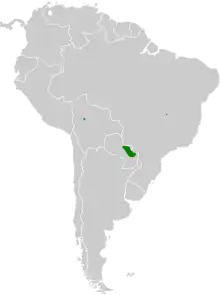Rufous-faced crake
The rufous-faced crake (Laterallus xenopterus) is a species of bird in subfamily Rallinae of family Rallidae, the rails, gallinules, and coots.[2][3][1] It is found in Bolivia, Brazil, and Paraguay.[4]
| Rufous-faced crake | |
|---|---|
 | |
| Scientific classification | |
| Domain: | Eukaryota |
| Kingdom: | Animalia |
| Phylum: | Chordata |
| Clade: | Dinosauria |
| Class: | Aves |
| Order: | Gruiformes |
| Family: | Rallidae |
| Genus: | Laterallus |
| Species: | L. xenopterus |
| Binomial name | |
| Laterallus xenopterus Conover, 1934 | |
 | |
Description
The rufous-faced crake is about 14 cm (5.5 in) long and weighs about 52 g (1.8 oz). The sexes are alike. They have a blue-gray bill, legs, and feet. They have a rufous face, hindneck, and upper back; a white throat and belly; and a buffy ochraceous foreneck and breast. Their upperwing coverts, secondaries, and scapulars have black and white bars as do their flanks. Their tail and undertail coverts are black.[5]
Distribution and habitat
The rufous-faced crake is found in northeastern Bolivia's Beni Department, in several states in south-central Brazil, and in central Paraguay.[5] It is known from perhaps a dozen widely scattered locations in those areas[5] but "given the suitable habitat in intervening areas and elsewhere[...]the species may be more widespread and less local than suspected."[6] It inhabits marshes, especially the zones of moist to shallowly flooded tussocky or matted grass.[5]
Behavior
Movement
No movements are known for the rufuous-faced crake.[5]
Feeding
The rufous-faced crake's foraging techniques and diet have not been documented.[5]
Breeding
Nothing is known about the rufous-faced crake's breeding biology.[5]
Vocalization
The rufous-faced crake's song is "a drawn-out, slightly descending trill". It also makes "[s]oft call notes "piú piú'".[5]
Status
The IUCN originally assessed the rufous-faced crake as Threatened but since 1994 has rated it as Vulnerable. Its known areas of habitation are small and widely scattered, and its estimated population of 2500 to 10,000 mature individuals is believed to be decreasing. Loss of habitat by conversion to agriculture (corn and soybeans) and silviculture (Eucalyptus and pines) has played a major role in the species' decline. "The most significant threat is possibly the widespread use of pesticides, fertilisers and other chemicals."[1]
References
- BirdLife International (2016). "Laterallus xenopterus". IUCN Red List of Threatened Species. 2016: e.T22692374A93351150. doi:10.2305/IUCN.UK.2016-3.RLTS.T22692374A93351150.en. Retrieved 29 November 2022.
- Gill, Frank; Donsker, David; Rasmussen, Pamela, eds. (August 2022). "Flufftails, finfoots, rails, trumpeters, cranes, limpkin". IOC World Bird List Version 12.2. International Ornithologists' Union. Retrieved 25 November 2022.
- HBW and BirdLife International (2021) Handbook of the Birds of the World and BirdLife International digital checklist of the birds of the world. Version 6. Available at: http://datazone.birdlife.org/userfiles/file/Species/Taxonomy/HBW-BirdLife_Checklist_v6_Dec21.zip retrieved August 7, 2022
- Remsen, J. V., Jr., J. I. Areta, E. Bonaccorso, S. Claramunt, A. Jaramillo, D. F. Lane, J. F. Pacheco, M. B. Robbins, F. G. Stiles, and K. J. Zimmer. Version 24 July 2022. Species Lists of Birds for South American Countries and Territories. https://www.museum.lsu.edu/~Remsen/SACCCountryLists.htm retrieved July 24, 2022
- Taylor, B., P. F. D. Boesman, E. de Juana, and C. J. Sharpe (2020). Rufous-faced Crake (Laterallus xenopterus), version 1.0. In Birds of the World (J. del Hoyo, A. Elliott, J. Sargatal, D. A. Christie, and E. de Juana, Editors). Cornell Lab of Ornithology, Ithaca, NY, USA. https://doi.org/10.2173/bow.rufcra1.01 retrieved November 29, 2022
- Brace, Robin; Hornbuckle, Jon; St. Pierre, Paul (1998). "Rufous-faced Crake Laterallus xenopterus: a new species for Bolivia, with notes on its identification, distribution, ecology and conservation" (PDF). Cotinga. 9: 76–80. Retrieved November 29, 2022.
